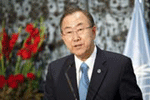Published on Sun, 2013-09-08 00:00
“Despite the global progress with regards to literacy, disadvantaged populations and individuals are still excluded from quality learning provision” concludes the Global Report for Adult Learning and Education. The report, titled “Rethinking Literacy” was launched in Amman, Jordania on 8th September 2013 and it places a special focus on adult literacy as a foundation for adult learning and education, in addition to other topics such as promoting, financing and conducting quality assurance for adult education programmes and strategies. Carolyn Medel-Anonuevo, from UNESCO's Institute for Lifelong Learning pointed out that "literacy courses are only the first step to lifelong learning and that they should prepare people for future learning by encouraging skills to critically analyse information and take decisions." |
Published on Mon, 2013-09-02 09:16
The political stalemate continues in Egypt; the dismissal of the Rabeaa and Al‐Nahda sit‐ins was one of its bloodiest events. Although many players are keen to protect the Egyptian state, safeguard its persistence and support its role, efforts are still required on all fronts, including the international front, to reach effective and permanent solutions s that respect human rights and allow for a resumption of the transitional political process. This process includes promulgating a new constitution that meets the aspirations of all Egyptians s of all factions and affiliations and making conditions suitable for holding fair, democratic and unchallengeable elections. This will guarantee the right of Egyptian men and women to decide a future for them and for their representative institutions. The Arab NGO Network for Development (ANND), Beirut released a statement on August 27, 2013. |
Published on Fri, 2013-08-30 00:00
The U.S. Federal Reserve recently announced it is reviewing its policy allowing financial firms to trade in physical commodities, which has been known to distort market prices of food, fuels, and metals. This reassessment comes almost a decade after the Fed ruled that Citigroup Inc. could continue trading in physical commodities after finding the practice within the bounds of the firm’s trading and investing in financial instruments. |
| Published on Mon, 2013-08-26 00:00 |
Published on Thu, 2013-08-22 13:37
"A life of dignity for all" should be the common goal of world governments, says Ban Ki-moon, Secretary General of the United Nations in the report sent on Friday August 16 to the General Assembly of the UN. The sixty agencies and programs of the UN dealing with development currently guide their actions by the Millennium Development Goals proposed and imposed at the beginning of the century by donors, without the member states having had a chance to discuss them. The MDGs "expire" in 2015 and their replacement by a new development agenda is being hotly debated by the international community, including now also civil society organizations, philanthropic foundations, corporations and even the Internet-based social media. |
SUSCRIBE TO OUR NEWSLETTER







